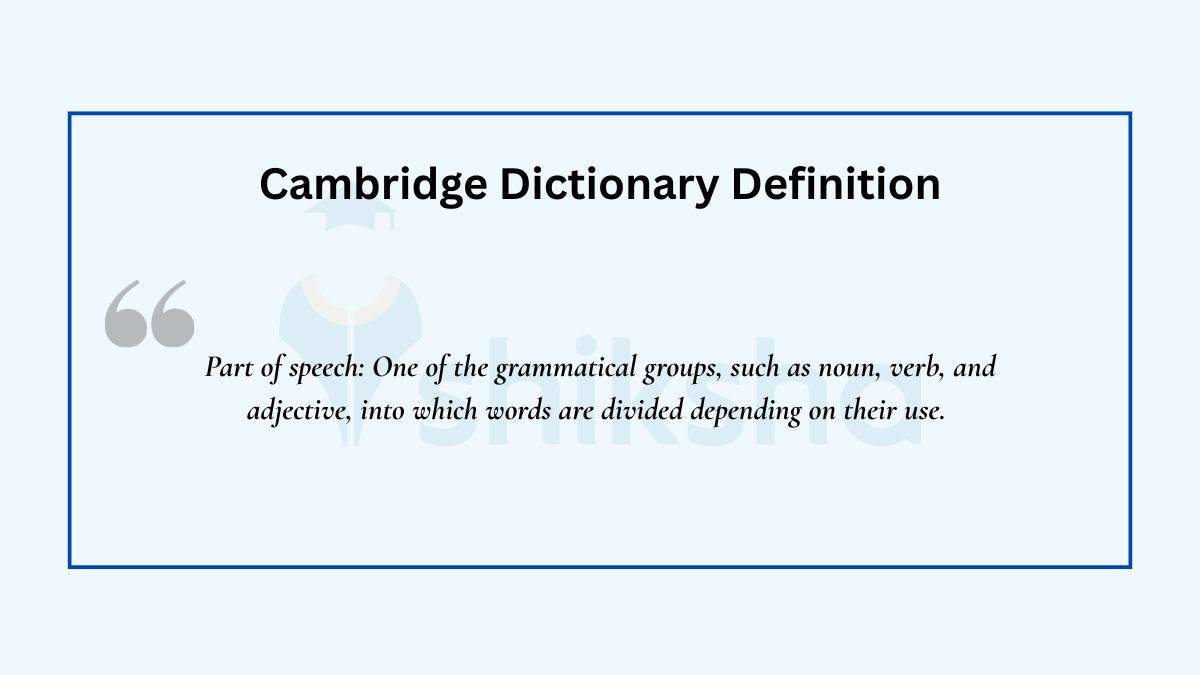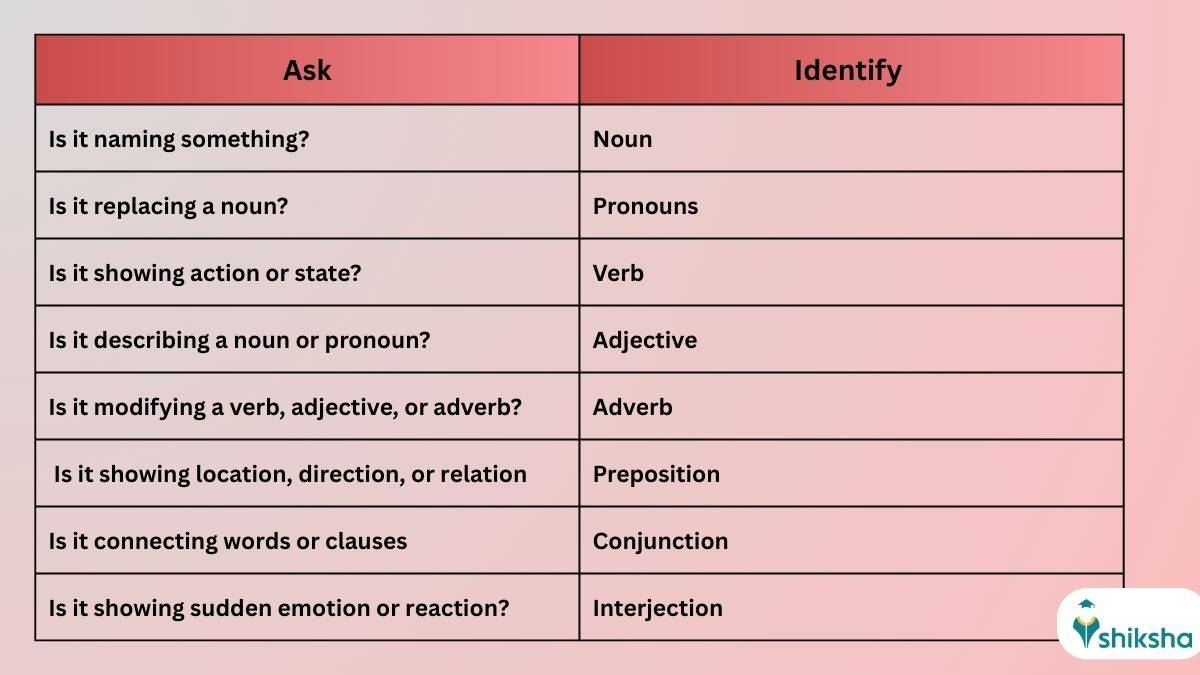
The parts of speech or a word class are the categories of words which segregate words based on their function and role in a sentence. Their functions include naming, describing or connecting words and ideas. In simple words, in the English language, every word of a sentence or paragraph is a part of speech. There are primarily eight parts of speech in English grammar. These include nouns, pronouns, verbs, adjectives, adverbs, prepositions, conjunctions and interjections.
To clearly and effectively communicate in the English language and form grammatically correct sentences, knowing and learning the above 8 parts of speech of grammar is vital and essential. Mastering the parts of speech in grammar are important as they build a strong foundation in the language and its grammar. Here, we have shared a comprehensive guide for the students to learn what are the parts of speech, types of parts of speech, definition and examples, tricks on how to identify parts of speech in a sentence and exercises with answers to practice parts of speech.
Why are parts of speech important in English grammar?
Parts of Speech in English Grammar are very important as they help in constructing grammatically correct sentences which also make sense. They help in improving writing, speaking skills and also help the students prepare for any competitive, entrance or school-level exams.
Parts of speech is an important topic in exams such as CAT, IELTS, IPMAT, SSC, etc.
Can a word belong to more than one part of speech?
Yes, one word in English can belogn to more than one part of speech. A single word can function as more than one part of speech, depending on how it's used in a sentence.
For example:
- I run every morning. (Verb)
- I went for a run. (Noun)
- I will work late today. (Verb)
- I am on my way to work. (Noun)
- What Are Parts of Speech in English?
- Parts of Speech Definition and Examples
- What Are The 8 Parts of Speech in English Grammar: Definition and Examples
- Quick Tips to Learn Parts of Speech in Grammar
- Why is Learning Parts of Speech Important?
- How to Identify Parts of Speech in English Grammar?
- Best Books to Learn Parts of Speech
- Open Word Class vs Closed Word Class
- Parts of Speech Exercises with Answers
- Related English Grammar Topics for Parts of Speech Preparation
- FAQs on Parts of Speech
What Are Parts of Speech in English?
As mentioned above, parts of speech in the English language explain what is the role of the word in the sentence. They are the classes into which words are grouped based on their function and usage in grammar.
Every word that one speaks, writes or reads is a part of speech. In other words, parts of speech describe how a word is used, not what the word is.
For example:
- Ariana runs fast. (Here runs is a verb showing the action of Ariana)
- Ariana is fast. (Here fast is an adjective describing Ariana)
Commonly asked questions
How can I easily identify the part of speech of a word?
Following are the tips to quickly identify the part of speech of a word:
- Words ending in -ly are often adverbs such as quickly, commonly, absolutely, etc.
- If a word can be replaced and the sentence still makes sense, it's likely a pronoun.
- If adding “do” can make sense around it, it's likely a verb.
- Removing a word without breaking the sentence generally means it's an adjective.
Are determiners part of the eight parts of speech?
Determiners were included under adjectives in traditional grammar, however, in modern grammar, determiners are a separate word class, not part of the classic eight parts of speech, but equally important. There are seven types of determiners in the English Language. In older or school-level grammar, determiners (like the, a, this, some, every) were grouped under adjectives because they come before nouns and modify them.
Parts of Speech Definition and Examples
According to the Oxford English Dictionary, parts of speech is “each of the classes into which words are divided according to their function in a sentence, such as a noun, verb and adjective, etc.”
Pronunciation: /ˌpɑːt əv ˈspiːtʃ/
According to the Collins Dictionary, “a part of speech is a particular grammatical class of word, for example noun, adjective or verb.”
What Are The 8 Parts of Speech in English Grammar: Definition and Examples
Primarily, there are eight types of parts of speech in English. These are listed below with definitions and examples:
Nouns
A noun is that part of speech which defines the name of a person, place, animal, idea and/or thing. In other words, noun is a naming word. It is a fundamental part of speech and is used in almost every sentence of the language.
Majorly, there are nine types of nouns in English grammar, such as Proper Nouns, Common Nouns, Concrete Nouns, Abstract Nouns, Collective Nouns, Countable Nouns, Uncountable Nouns, Singular Nouns and Plural Nouns.
Example of Nouns:
- Person: “Come on, Ross, you’re a palaeontologist.” – Phoebe from F.R.I.E.N.D.S
- Place: “I have spent my whole life trying to bring order to the universe by carefully planning every moment every day.” –Sheldon Cooper in Big Bang Theory
- Thing: “Who in the world am I? Ah, that’s the great puzzle”. - Alice in Alice in Wonderland
- Animal: “They are dragons, Khaleesi. They can never be tamed…not even by their mother.”- Jorah Mormont in Game of Thrones
- Idea: “Happiness can be found, even in the darkest of times, if one remembers to turn on the light.”- Albus Dumbledore
Pronouns
Pronouns are words in a sentence which are used in place of a noun to make a sentence or a paragraph more concise. In other words, a pronoun is a replacement for a noun.
There are 10 types of pronouns in English grammar, i.e. Personal Pronouns, Possessive Pronouns, Interrogative Pronouns, Indefinite Pronouns, Demonstrative Pronouns, Relative Pronouns, Reflexive Pronouns, Reciprocal Pronouns, Intensive Pronouns and Distributive Pronouns.
Pronoun Examples:
- Jack and Rose were having tea. They liked it
- Tanya treated herself to a spa day on her
- It was he who decided to move to another city.
- The team participated in the tournament. It won the first price.
Verbs
The verb is that component of speech or language which expresses an action, occurrence or state of being. The verb in a sentence can sometimes be the main verb and sometimes the helping verb. The number of verbs should be similar to the subject in the sentence.
The verbs in English grammar express and convey what is being done or what is happening. In the English language, there are two types of verbs, i.e. main verbs and helping verbs. These two kinds are further divided into subtypes.
Verbs have the tendency to change depending on the subject, tense, mood and/or voice. There are regular verbs and irregular verbs, too.
Also Read:
Examples:
- Priya was watching a movie last night.
- “The multiverse is a concept about which we know frighteningly little”- Doctor Strange
- “If you want to shine like a sun, first burn like a sun.”- Dr. APJ Abdul Kalam
- “If you want to walk fast, walk alone. But if you want to walk far, walk together.”
Adjectives
Words which describe the noun and pronoun in a sentence are called the adjectives. The Adjectives in English are those words which provide more information about the noun or the pronoun used in a sentence. These adjectives talk about the characteristics, qualities and/or attributes of the pronoun and the noun in grammar. In simple words, these add vividness to the sentences in the English language. The Adjectives are known to give the piece of writing or speech an evocative feel.
There are three forms of adjectives or degrees of comparison, namely, the Positive or Absolute Form of Adjective, Comparative Form of Adjective and the Superlative Form of Adjectives. These are the degrees of comparison which are used to compare similar qualities of different subjects.
Adjectives can be mainly classified into four types. These are Possessive Adjectives, Interrogative Adjectives, Demonstrative Adjectives and Compound Adjectives.
Examples:
- The little girl was wearing a very pretty (pretty is the adjective which describes the hat that the little girl is wearing)
- Rachel was wearing a green dress for her birthday party. (green is describing the dress)
- The food served at the wedding was delicious.
- MF Hussain was a fine
Adverbs
As the name suggests, adverbs in grammar are words related to adjectives and verbs. Simply, the adverbs in English are the words which describe or modify an adjective, a verb, another adverb, a clause or a preposition in English grammar. They never modify or describe a noun in a sentence.
Broadly, there are six types of adverbs in grammar. These are Adverbs of Manner, Adverbs of Time, Adverbs of Degree, Adverbs of Place, Conjunctive Adverbs and Adverbs of Frequency.
Examples:
- Rajveer went to a club yesterday as it was his birthday. (Adverb of Time)
- Raj has been hardly He might fail the exam. (Adverb of Manner)
- “I absolutely have to win.”- Monica Geller from F.R.I.E.N.D.S (Adverb of Degree)
- Ananya always arrives on time.
- Kids really enjoy ice creams in summers (Adverb of Degree)
- Lisa often goes to church on Sundays. (Adverb of Frequency)
Prepositions
The prepositions are those words in English which are placed before a noun or a pronoun to show their relationship with other words in a sentence. In other words, English prepositions are the links between the two parts of the sentences.
Usually, a sentence without a preposition is incomplete. There are different types of preposition that are used in our everyday life to indicate time, location, etc. These include Preposition of Place, Preposition of Time, Preposition of Direction, Preposition of Manner, Preposition of Cause, Reasoning and Purpose.
There are five kinds of prepositions in English such as Simple, Compound, Phrase, Participle, and Double.
Examples:
- All the kids jumped into the swimming pool.
- The freedom fighters fought for the nation.
- Tanya ran across the road to catch the ball.
- Saniya played tennis like a star.
Also Read: Paraphrasing worksheet with answers
Conjunctions
In English, the sentences are joined together using conjunctions. Simply, a conjunction is that part of speech which joins words, sentences, phrases, and/or clauses. With the help of conjunctions, one can make complex sentences that may express multiple ideas. They act as the building blocks of grammar.
Majorly, there are three types of conjunctions. These include Correlative Conjunctions, Subordinating Conjunctions, and Coordinating Conjunctions.
Prep Tip: The most common type of conjunctions are learnt using the FANBOY acronym, which are also called the FANBOY conjunctions.
Examples:
- Not only Sarah but also Raymond is from the USA. (Coordinating Conjunction)
- White was reading the book while Mr. White was watching the TV. (Subordinating Conjunction)
- Professor Geller goes to the university regardless of the weather. (Subordinating Conjunction)
- We are planning to go to either Bali or (Correlative Conjunction)
- Namita would rather stay home than go to the club. (Correlative Conjunction)
Interjections
Interjections, among the other different parts of speech, are words which express sudden emotions or feelings in the English language. These are often standalone parts of the sentence. Interjections in English grammar express emotions such as surprise, shock, pleasure, pain, sadness, etc.
It is usually defined as a short sound, expression or emotion.
Examples of Interjections:
- Wow! That is so cool.
- Hurrah! We won the chess championship.
- Oh, what a beautiful view!
- Yuck, that is so gross!
Here is a sentence which has all the parts of speech of the English language:
Quick Tips to Learn Parts of Speech in Grammar
Now that we have looked at the definition of each part of speech, take a look at the table below to get some quick tips on how to learn the parts of speech quickly.
| Part of Speech |
Function |
Example |
|---|---|---|
| Noun |
Names |
Regina lives in Mumbai. |
| Pronouns |
Replaces nouns |
They play with their dog every day. |
| Verb |
Action |
Rohan and Ritika are dancing. |
| Adjective |
Describes a noun or pronoun |
I bought a red dress for the party. |
| Adverb |
Modifies verb/adjective/adverb |
He is a very strong man. |
| Preposition |
Shows relationship |
The lion was in its den. |
| Conjunction |
Joins clauses or words |
I like peace and quiet. |
| Interjection |
Expresses emotions and feelings |
Ouch! I am hurt. |
Why is Learning Parts of Speech Important?
Learning and understanding the parts of speech in English grammar is important as they are the building blocks of a sentence. Each word in a sentence plays an important role in building it and helping people to communicate clearly. In other words, parts of speech are the map of English grammar. Listed down are some of the reasons why learn parts of speech:
- Improving Sentence Construction: Making grammatically correct sentences is a key component of learning and speaking English. These grammatically correct sentences give meaning to the sentence and aid clear communication.
Example:
Incorrect: Shraddha quick runs.
Correct: Shraddha quickly runs.
- Avoids Grammar Mistakes: Usually, students make common grammar mistakes when learning the language. Learning the parts of speech help the students avoid grammar mistakes and make correct sentences.
- Boosts Better Communication: A better understanding of word classes will give way to expressing ideas more clearly and hence aiding better communication. Learning parts of speech will be helpful in verbal communication, writing emails, essays, etc. If you are writing letters, professional emails or documents, learning these parts of speech will help you revise and polish your work.
Also Read:
Letter Writing Formal Letter Writing and Formats Informal Letter Writing and Formats - Makes Learning English Easier: While learning parts of speech, students may come across new words and phrases, understand tenses, and complex English sentence structures. This will, in turn, improve their vocabulary.
- Important for Competitive Exam Preparation: Competitive exams often have a section on English grammar. These exams, such as IELTS, IPMAT, CAT, etc., test the candidate’s grasp of grammar and language. Hence, learning parts of speech and preparing for it can be very useful to score well in such exams.
How to Identify Parts of Speech in English Grammar?
Sometimes, it is difficult to identify which part of speech the word is in a sentence. Check below some of the quick and easy tips to identify the parts of speech in sentences:
- An adjective ending with –ly, is an adverb. For example: quickly, commonly, absolutely
- If the noun can be swapped and the sentence still makes sense, it is a pronoun
- If there is an action happening and the word ‘do’ can be added to modify the sentence, then it’s a verb
- A word removed from the sentence and it still makes sense, even though you tend to loose some detail, then it is probably an adjective.
Best Books to Learn Parts of Speech
It is crucial to refer to the recommended books for an effective preparation strategy for parts of speech in English. Refer to the table below to know the best books for the 8 Parts of Speech:
| Books |
Author/Publication |
|---|---|
| English Grammar and Composition |
Wren and Martin |
| How to Tell the Parts of Speech |
John George Repplier McElory and Edwin A Abbott |
| Parts of Speech- Basics of English Grammar |
Kuldeep Yadav and Sandeep Yadav |
| Parts of Speech |
Ranbir Singh |
You can find a variety of other such preparation books for Parts of Speech in offline markets, online PDFs, and more.
Read More:
Open Word Class vs Closed Word Class
Parts of Speech Exercises with Answers
Related English Grammar Topics for Parts of Speech Preparation
FAQs on Parts of Speech
English Parts of Speech Exam
Student Forum
Other Topics under this Chapter
Other Class 10th English Chapters
- English Past Tense
- English Idioms
- English Punctuation
- English Analogy
- English Interjections
- English Prefixes
- English Adjectives
- English Future Continuous Tense
- English Letter Writing
- English Suffix
- English Grammar
- English One Word Substitution
- English Mood
- English Direct and Indirect Speech
- English Figures of Speech
- English Composition
- English Para Jumbles
- English Reading Comprehension
- English Sentences
- English Auxiliary and Modal Verbs
- English Formation of Words
- English Precis Writing
- English Nouns
- English Adverbs
- Conjunctions
- English Prepositions
- English Verbs
- English Paraphrasing
- English Articles
- English Subject and Predicate
- English Pronouns
- English Tenses
- English Active and Passive Voice
- English Vocabulary
- English Subject Verb Agreement
- English Phrases
- English Synonyms
- English Etymology and Roots
- English Spelling Rules
- English Parts of Speech
- English Gerunds



